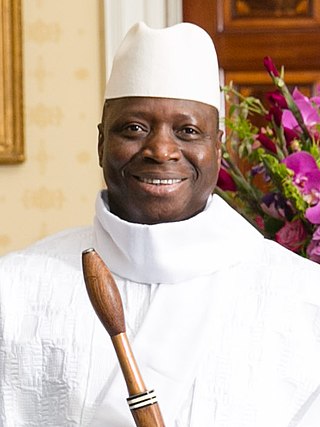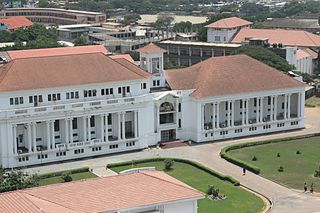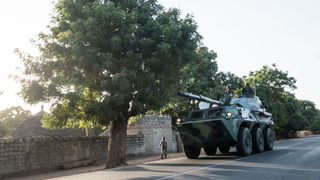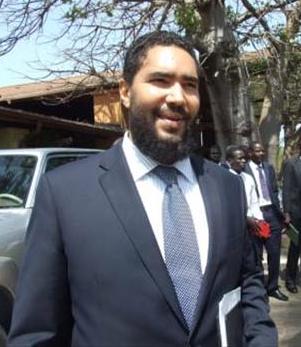Abubakar Datti Yahaya (born 27 January 1952) is a Nigerian judge who is currently a Justice of the Supreme Court of the Gambia.
Abubakar Datti Yahaya (born 27 January 1952) is a Nigerian judge who is currently a Justice of the Supreme Court of the Gambia.
Yahaya was called to the bar in Nigeria on 2 July 1976. He served as a judge on the High Court of Kaduna State before becoming a justice of the Court of Appeal of Nigeria on 15 February 2008. His term is to end on 27 January 2022. [1] He was a former Vice president of the Nigerian Red Cross Society, He was also a former President of the Court of appeal, The Gambia, 2000- 2003. A former member of the Common Wealth Magistrates and Judges Association (CMJA). Yahaya was sworn in on the Supreme Court of the Gambia on 30 December 2016, in order to hear President Yahya Jammeh's petition to overturn the 2016 presidential election result. [2]

The Gambia, officially the Republic of The Gambia and Gambia, is a country in West Africa. Geographically, Gambia is the smallest country in continental Africa; it is surrounded by Senegal, except for its western coast on the Atlantic Ocean. It is situated on both sides of the lower reaches of the Gambia River, which flows through the centre of the country and empties into the Atlantic Ocean. The national namesake river demarcates the elongated shape of the country, which has an area of 11,300 square kilometres (4,400 sq mi) and a population of 2,468,569 people in 2024. The capital city is Banjul, which has the most extensive metropolitan area in the country; the second- and third-largest cities are Serekunda and Brikama.

Politics of The Gambia takes place within the framework of a presidential republic, whereby the President of The Gambia is both head of state and head of government, and of a multi-party system. Executive power is exercised by the government. Legislative power is vested in both the government and parliaments.

The Supreme Court of New Zealand is the highest court and the court of last resort of New Zealand. It formally came into being on 1 January 2004 and sat for the first time on 1 July 2004. It replaced the right of appeal to the Judicial Committee of the Privy Council, based in London. It was created with the passing of the Supreme Court Act 2003, on 15 October 2003. At the time, the creation of the Supreme Court and the abolition of appeals to the Privy Council were controversial constitutional changes in New Zealand. The Supreme Court Act 2003 was repealed on 1 March 2017 and superseded by the Senior Courts Act 2016.

Yahya Abdul-Aziz Jemus Junkung Jammeh is a Gambian politician and former military officer, who served as President of the Gambia from 1996 to 2017, as well as Chairman of the Armed Forces Provisional Ruling Council from 1994 to 1996.

The Supreme Court of India is the supreme judicial authority and the highest court of the Republic of India. It is the final court of appeal for all civil and criminal cases in India. It also has the power of judicial review. The Supreme Court, which consists of the Chief Justice of India and a maximum of fellow 33 judges, has extensive powers in the form of original, appellate and advisory jurisdictions.

The Supreme Court of Ghana is the highest judicial body in Ghana. Ghana's 1992 constitution guarantees the independence and separation of the Judiciary from the Legislative and the Executive arms of government.

The judicial officers of the Republic of Singapore work in the Supreme Court and the State Courts to hear and determine disputes between litigants in civil cases and, in criminal matters, to determine the liability of accused persons and their sentences if they are convicted.

Hassan Bubacar Jallow is a Gambian judge who has served as Chief Justice of the Gambia since February 2017. He was the Prosecutor of the International Criminal Tribunal for Rwanda (ICTR) from 2003 to 2016, and Prosecutor of the International Residual Mechanism for Criminal Tribunals (IRMCT) from 2012 to 2016, both at the rank of United Nations Under Secretary-General. He served as Minister of Justice and Attorney General from 1984 to 1994 under President Dawda Jawara.

Adama Barrow is a Gambian politician and real estate developer who has served as President of the Gambia since 2017.

A constitutional crisis occurred in Gambia following presidential elections in December 2016, in which challenger Adama Barrow achieved an upset victory over longtime incumbent Yahya Jammeh. It eventually concluded after a military intervention by the Economic Community of West African States (ECOWAS) led to Jammeh’s departure from the country.

The ECOWAS military intervention in the Gambia or the ECOWAS Mission in The Gambia – initially code-named Operation Restore Democracy – is a military intervention in The Gambia by several member states of the Economic Community of West African States.
Nicholas Colin Browne-Marke is a British-born judge of Sierra Leone Creole parentage. He is currently a Justice of the Supreme Court of Sierra Leone and a Justice of the Supreme Court of the Gambia.

The Supreme Court of the Gambia is a superior court of record and the highest court in The Gambia. Established in 1851, it has appellate and original jurisdiction over any law exceeding the powers conferred by the Constitution or any law upon the National Assembly or any other person or authority.
Emmanuel Oluwasegun Fagbenle is a Nigerian judge who served as Yahya Jammeh's last Chief Justice of the Gambia from 2015 to 2017, until the 2016 presidential election.
Joseph Wowo is a Nigerian barrister who joined the Gambian judiciary in 2000 and became the chief justice of Gambia from 20 June 2013 until 19 July 2013.
Emmanuel Akomaye Agim is a Nigerian judge who was chief justice of Gambia from 2009 to 2013 former chief justice of Swaziland. former justice at the Nigerian Courts of Appeal. and currently a Justice of the Supreme Court of Nigeria.
Abdou Kareem Savage was the Chief Justice of the Gambia from 22 February 2006 till 8 June 2009. He was the first Gambian judge to ever hold this position. He was preceded by Stephen Alan Brobbey and, when removed from office by President Yahya Jammeh in 2009, succeeded by Akomaye Agim.

Basiru V.P. Mahoney is a Gambian lawyer, politician and judge who served as Attorney General of The Gambia from 27 August 2014 to 9 January 2015. He previously served as the Solicitor General and Legal Secretary between May 2013 and August 2014 and as a Judge of the High Court between 2009 and 2013. Basiru Mahoney currently serves as a Judge of the Court of Appeal of The Gambia.

Presidential elections were held in the Gambia on 4 December 2021. The result was a victory for incumbent President Adama Barrow of the National People's Party, who received 53% of the vote, defeating five other candidates.
Capital punishment remains a legal penalty for multiple crimes in The Gambia. However, the country has taken recent steps towards abolishing the death penalty.